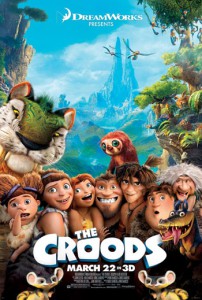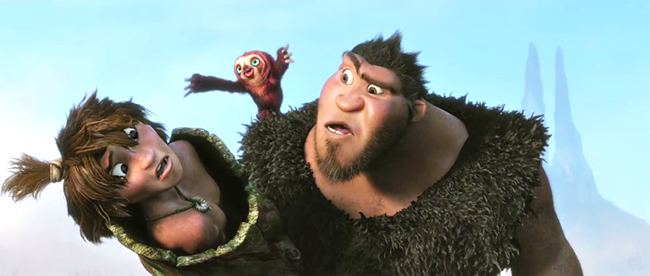
Written and directed by Chris Sanders and Kirk De Micco
USA, 2013
2010’s How to Train Your Dragon is arguably Dreamworks Animation’s creative high point to date, and was directed by Chris Sanders and Dean DeBlois, the team behind Lilo & Stitch, one of the best hand-drawn animations from Disney since their 90s renaissance. DeBlois is steering some Dragon sequels solo, but Dreamworks’ latest all CGI film – their first released through 20th Century Fox – marks the latest effort from the increasingly reliable Sanders, co-directing here with Kirk De Micco. The Croods, an awkward blend of bland sentimentality and cartoonish humour, marks an end to Sanders’ winning streak.
The titular Croods are a prehistoric family led by patriarch Grug (Nicolas Cage), who is over-protective and keeps his family holed up in a dark cave on any occasion when they’re not hunting for food. Rebellious teenage daughter Eep (Emma Stone) wants to explore her curiosity regarding the land, which of course causes conflict with her father. These urges are heightened by her encounter with the mysterious, worldly Guy (Ryan Reynolds), who introduces her to, among other things, fire, and preaches of the imminent “end of the world”. Sure enough, tectonic plates soon start shifting, forcing the Crood family to team up with Guy to venture through an array of new pastures to find a future home.
The Croods begins as Eep’s story, following her archetypal adventure-seeking urges, but partway through Grug becomes the main focus, the film exploring his struggles with loosening his grip, becoming more open-minded, and his family unit finding solace with Guy and his innovative ways. The storytelling is quite basic and the thematic explorations very much surface-level deep and one-note. As such, it’s difficult to get particularly invested in the character’s emotional journeys. Additionally, for a film named after the family unit, it’s odd that only Eep, Grug and non-family member Guy have any sort of vaguely rounded development. Mother Ugga (Catherine Keener) remains largely undefined for the entire film, while the others exist solely as one-dimensional vessels for weak humour: the feral infant, the dumb teenage son (Clark Duke), and the cranky, crazy mother-in-law (Cloris Leachman) that Grug wishes would just die already.
The Croods’ narrative and ideas are an amalgamation of many prior works, and the feel of a jumbled collection extends to its humour. There’s a fair amount of tepid Flintstones-style anachronisms with the film’s visual jokes, and some relating to music, the aping even going so far as to have an animal sidekick for Guy who is both called Belt and acts as one; voiced by Chris Sanders, the character both sounds and feels like a blatant attempt to replicate the appeal of the director’s earlier performance as Disney’s Stitch.
The work’s design also feels heavily in debt to other filmic efforts, specifically Avatar of all things. The world beyond the cave features no prehistoric creatures you might be familiar with, but it does have lushly coloured Pandora-style jungles populated by beasts that sometimes feel akin to fluffier versions of James Cameron’s creations. Despite the arguable tendency for mimicry, some occasionally stirring set pieces and the strength of the environments and creatures’ visual realisation mean that the film’s design is its greatest strength, at least up to a point. The Croods is unfortunately in possession of some oft-ghastly designs for the human characters, and the unpleasant feel only slightly fades as the film goes on.
The film leaves itself open for a potential sequel, abandoning the stakes and consequences of one potentially interesting final act gesture, and throwing in newly tamed versions of established creatures as potential pets in its concluding scenes. None of the characters feel vital enough to muster any enthusiasm for a continuation, and as nice as the film’s environments can be, the world-building that occurs here ultimately feels rather hollow. The Croods may survive “the end”, but it’s hard to care if their story is to be continued.
Josh Slater-Williams



